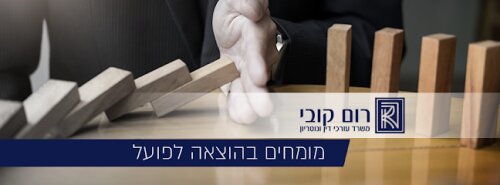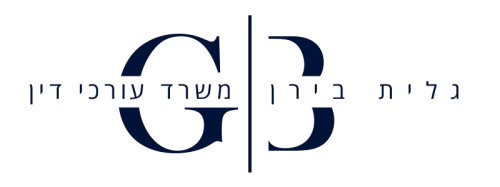Best Antitrust Litigation Lawyers in Ramat Gan
Share your needs with us, get contacted by law firms.
Free. Takes 2 min.
List of the best lawyers in Ramat Gan, Israel
About Antitrust Litigation Law in Ramat Gan, Israel
Antitrust litigation in Ramat Gan, Israel, is a legal process that addresses disputes involving anti-competitive behavior within markets. It is governed primarily by national Israeli laws, such as the Economic Competition Law, 1988. Businesses or individuals in Ramat Gan may seek legal solutions when experiencing or alleging unfair competition practices such as monopolies, price-fixing, abuse of dominant position, or restrictive agreements. While the laws are national, cases are frequently heard in Tel Aviv district courts, due to Ramat Gan's proximity to Tel Aviv. Local lawyers specializing in antitrust litigation can help navigate the unique aspects of these cases within the region.
Why You May Need a Lawyer
If you live or do business in Ramat Gan and face issues related to unfair competition, consulting with an experienced antitrust litigation lawyer could be essential. Common situations requiring legal expertise include:
- Your business has been accused of participating in illegal restrictive arrangements or price-fixing.
- You suspect a competitor is abusing its market dominance to damage your business prospects.
- Regulatory bodies such as The Israeli Competition Authority are investigating your business operations.
- You want to report merger activities that may harm fair competition in your industry.
- You are facing damages due to actions by larger players in your market.
A lawyer can help you understand your rights, represent you in negotiations or courts, and ensure compliance with all relevant laws.
Local Laws Overview
Israeli antitrust and competition laws, applicable in Ramat Gan, are structured to prevent illegal monopolies, restrictive trade practices, and abuse of dominant positions. The principal legislation is the Economic Competition Law, 1988 (previously known as the Antitrust Law), which is enforced by The Israeli Competition Authority. Key elements include:
- Restrictive Arrangements: Agreements between businesses that may harm competition are often prohibited.
- Abuse of Dominant Position: A business with significant market power cannot exploit its status to limit competition.
- Merger Control: Mergers and acquisitions that might lessen competition require approval from the authority.
- Civil and Criminal Liability: Individuals and companies found in violation can face fines, damages, or even imprisonment.
- Private Litigation: Parties harmed by anti-competitive conduct can pursue civil claims, including class actions.
Frequently Asked Questions
What is antitrust litigation?
Antitrust litigation involves legal disputes or proceedings regarding alleged violations of competition laws, typically focused on activities that restrict market competition or harm consumers and competitors.
Who enforces antitrust laws in Israel?
The Israeli Competition Authority is the main regulator responsible for enforcing the Economic Competition Law and investigating potential violations.
Do antitrust laws apply to all businesses in Ramat Gan?
Yes, all businesses operating in Ramat Gan, regardless of size or industry, must comply with Israeli competition laws.
What are restrictive agreements?
Restrictive agreements are contracts or understandings between businesses that seek to limit competition, such as cartels, price-fixing, or market-division agreements.
Can I file a lawsuit if my business is harmed by anti-competitive conduct?
Yes, Israeli law allows individuals or companies harmed by unlawful competitive behavior to pursue civil claims for damages, including the possibility of joining or initiating class actions.
Are there criminal penalties for violating antitrust laws?
Serious breaches, such as participating in cartels, can result in criminal charges, financial penalties, and even prison sentences for individuals involved.
What is considered abuse of dominance?
Abuse of dominance occurs when a business with significant market power seeks to eliminate competition by unfair means, such as predatory pricing or refusing to supply essential goods or services.
How do I know if a merger requires approval?
Mergers that may significantly affect market competition must be reported and approved by The Israeli Competition Authority before completion.
How long do antitrust cases usually last?
The length of litigation varies depending on the complexity of the case, but these proceedings can take several months to years, especially if they involve appeals or detailed investigations.
Should I contact a lawyer if I receive an inquiry from the Competition Authority?
Yes, it is highly recommended to consult an antitrust legal professional immediately to understand your rights and obligations when contacted by regulatory authorities.
Additional Resources
To assist with antitrust litigation concerns in Ramat Gan, consider reaching out to the following organizations and resources:
- The Israeli Competition Authority - the official body regulating competition law and policy.
- Israel Bar Association - for a list of licensed attorneys and specialists in antitrust litigation.
- Academic institutions specializing in law and business, such as Bar-Ilan University, which often provide public legal education.
- Local business chambers or trade organizations in Ramat Gan, which may offer guidance or recommend experienced legal counsel.
Next Steps
If you believe you need assistance with an antitrust litigation matter in Ramat Gan:
- Gather all relevant documents and details about your situation, including any communications, contracts, or notices you have received.
- Contact a local antitrust lawyer or law firm with experience in Israeli competition law to schedule a consultation.
- Consult the resources listed above for general information and updates on local antitrust enforcement and policy.
- Take prompt action if you are under investigation or served with legal papers to ensure your rights are protected and deadlines are met.
Early legal advice and intervention are critical in antitrust cases. Connecting with a qualified attorney can help clarify your position and provide a clear strategy moving forward.
Lawzana helps you find the best lawyers and law firms in Ramat Gan through a curated and pre-screened list of qualified legal professionals. Our platform offers rankings and detailed profiles of attorneys and law firms, allowing you to compare based on practice areas, including Antitrust Litigation, experience, and client feedback.
Each profile includes a description of the firm's areas of practice, client reviews, team members and partners, year of establishment, spoken languages, office locations, contact information, social media presence, and any published articles or resources. Most firms on our platform speak English and are experienced in both local and international legal matters.
Get a quote from top-rated law firms in Ramat Gan, Israel — quickly, securely, and without unnecessary hassle.
Disclaimer:
The information provided on this page is for general informational purposes only and does not constitute legal advice. While we strive to ensure the accuracy and relevance of the content, legal information may change over time, and interpretations of the law can vary. You should always consult with a qualified legal professional for advice specific to your situation.
We disclaim all liability for actions taken or not taken based on the content of this page. If you believe any information is incorrect or outdated, please contact us, and we will review and update it where appropriate.














